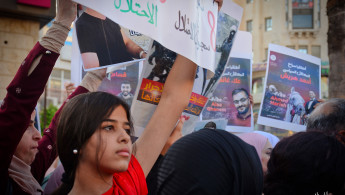Palestinian detainees declare 'general alert' ahead of hunger strike
Palestinian administrative detainees declared a general alert on Sunday, with less than a week to go before a hunger strike begins.
The Palestinian Prisoners' Club said that administrative detainees had taken urgent measures in all Israeli jails in preparation for a direct confrontation with Israeli prison services.
A week ago, administrative detainees announced the renewal of protest actions against the Israeli policy of administrative detention, which allows Israeli authorities to jail Palestinians indefinitely. A special committee containing all Palestinian political factions has been formed to lead the protest.
The prisoners are going to begin a mass hunger strike soon. They have formed a committee for administrative detainees in preparation.
— Mariam (@thisismyfakacc) June 4, 2023
Translation here btw:https://t.co/fgNGstAybz https://t.co/03jT6PLsRy
The announcement came a month after Palestinian protest leader Khader Adnan died in an Israeli jail after 86 days on hunger strike to protest his detention.
It was his sixth hunger strike since 2012 and his death appears to be an inspiration for the planned mass Palestinian prisoner protest.
"We will go on hunger strike to preserve the principle for which Khader Adnan gave his life, to put the question of administrative detainees seriously and effectively on the table," read a statement by the administrative detainees committee.
"We will confront the policies of the occupation and its secret services, who take delight in stealing our lives away through administrative detention."
Ayah Shreiteh, spokesperson for the Prisoners' Club, told The New Arab: "Declaring general alert basically means that detainees make preparations to confront repressive actions by the occupation prison services, and prepare themselves for the hunger strike.
"The detainees took this step because the occupation's reactions already started, as the detainees leaders have been taken to interrogation every day, since the announcement of the hunger strike to begin next week."
"Their basic demand is to put an end to the widespread, unlimited use of administrative detention, through which the occupation puts even children behind bars," pointed out Shreiteh. "The long-term demand, of course, remains the end of administrative detention altogether, not just putting limits to it."
Last year, hundreds of Palestinian administrative detainees boycotted Israeli court hearings for over ten months to protest their detention. In October, dozens of Palestinian detainees launched a hunger strike that lasted 19 days to draw attention to their cases.
"The difference between the last hunger strike and the coming one, is that this time, detainees don't just want to draw attention, they have concrete demands," Guevara Taha, daughter of Palestinian administrative detainee Thaer Taha, told TNA.
"This means that this strike will not end easily and might go on for a long period, which puts the lives of detainees at risk. At home, we are already living through the anguish, before it starts."
Palestinian administrative detainees have announced that they will engage in a mass hunger strike on 18th June, in protest of Israel's policy of administrative detention. pic.twitter.com/aFYcMgNV9e
— Chris Hutchinson (@ChrisHu34451470) June 6, 2023
In early May, a UN report called for accountability for Israel's policy of mass incarceration, including through administrative detention, and for the death of Khader Adnan.
"We cannot separate Israel's carceral policies from the colonial nature of its occupation, intended to control and subjugate all Palestinians in the territory Israel wants to control," read the UN experts' report.
"The systematic practice of administrative detention, is tantamount to a war crime of wilfully depriving protected persons of the rights of fair and regular trial."
Israel has used administrative detention against Palestinians more and more since last year. According to the Palestinian official Prisoners and Detainees Affairs Commission, Israeli forces have issued 1,300 detention orders since the beginning of the year, including 300 orders in May alone.
These include detention renewal orders, often issued for Palestinian detainees shortly before their release and whose current orders are about expire.
Currently, some 1,200 Palestinians are detained without charges under the administrative detention system, most of them former prisoners in Israeli jails.
According to human rights groups, administrative detainees include 14 minors and two women.





 Follow the Middle East's top stories in English at The New Arab on Google News
Follow the Middle East's top stories in English at The New Arab on Google News


